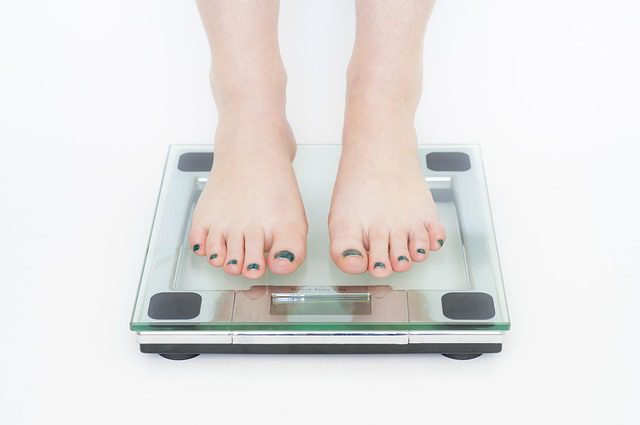
The discourse on Catholic social media has turned to fat and fat shaming lately.
A prominent Catholic celebrity who got famous in a dubious way is tut-tutting fat people, sharing details about their “weight loss journey,” enumerating the pounds they’ve lost, warning us we’re going to die, and promising to help us get in shape, and it’s drawn quite a bit of attention.
I have something to say on this topic. I tried to tweet it, but it’s a little bit too long for Twitter. I thought about not saying it at all, because I have a snarky sense of humor and I sometimes say cruel things myself. But I think it’s important to say, so I’m going to put it here.
And I want to stress from the beginning, this is NOT a success story. It’s just my story.
As comment box trolls have been delighting in telling me for the past several years, I am fat. They always say this as if it’s brand new information and deeply wounding to me, but believe me, I know. I’ve been getting teased for being fat since I was a child.
I guess the trouble all started when I was about three years old and had Juvenile Rheumatoid Arthritis in my knee. The rheumatoid arthritis went into remission as mysteriously as it came about a year later, leaving me with a little lump in the cartilage and one turned-out foot. I was lucky. Rheumatoid arthritis can be devastating, but all it gave me was a very slightly odd gait you wouldn’t notice if you weren’t looking at my feet. I was also pretty clumsy. My pediatrician said that since I was limping and in pain at such a crucial developmental stage, I missed a few motor skill milestones on schedule, which is why I was so awkward and bad at sports. And, partly due to that awkwardness and partly due to plain old bad luck, I caught my foot in a deep rut a car had left in the edge of our lawn when I was running around the yard when I was seven. I broke my ankle, but due to circumstances we won’t get into right now, nobody would believe that my ankle was broken until I’d been limping on it in agonizing pain for five days. That was when I went to the emergency room and got my cast. After that, I was not only clumsy but a little traumatized and afraid to run. I still am. And that was when I started to get a bit plump.
Plump people who are afraid to run are fair game for bullies, and not all bullies are children. I’ve spoken about the gym teacher who bullied me before. I was also bullied by students. And that didn’t make me want to overcome my fear and get some more exercise, because they teased me for how I looked when I exercised, so I got plumper, which further encouraged the bullies.
Puberty started for me when I was about eleven, with a host of bizarre symptoms we won’t get into here. The important thing was, I got more than plump. I got fat. I still have the stretch marks on the insides of my legs from where I ballooned overnight, and then the real bullying began– by certain people in my community who genuinely believed they were doing a good thing to “encourage” me to lose weight. I got called names. I was mocked and humiliated when I tried on new clothes. People would slap my thighs if I wore shorts or poke my tummy if I didn’t, to remind me that I was too fat. Every bite that went into my mouth at the supper table was loudly criticized in front of my siblings and cousins, which recruited them into making fun of me as well. I was once ordered to wear excruciatingly painful undergarments with a girdle in them to a singing recital, even though it’s extremely difficult to sing if you can’t breathe, because my family was mortified by my round paunch.
I got signed up for Weight Watchers the first time when I was almost twelve, and again several more times in my teen years. I’ve seen Weight Watchers claim they don’t allow children on their programs, but they’re not telling the truth. In the nineties, in Ohio at least, all it took to put a child on Weight Watchers was a parent’s signature, and then I was whisked back to the scale and praised if I lost eight ounces or critiqued if I gained. On Weight Watchers’s low fat high carb diet plans from the nineties, I would lose several pounds at first, and then I would gain them back with interest even though I was trying as hard as I could. This happened every time. And when I gained weight, my family would make fun of me to encourage me to do better.
The net result of all of this was not weight loss. It was an unhealthy relationship with sweets, extremely low self-esteem, and eventually estrangement from most of my family. I know they thought they were doing me good, but they were torturing me. I couldn’t take it anymore.
As an adult, my weight issues continued and so did the strange symptoms I’ve written about elsewhere. I was diagnosed with chronic fatigue and then fibromyalgia, but medicines that show promise in fibromyalgia patients (insofar as there are any) didn’t usually work for me. I was often told it was probably just because I was fat. I took a host of weird herbal supplements all of which worked a little, but I didn’t know why. When I had energy in between fatigue spells I would exercise as best I could– I went jogging and neighbors snickered at me for how funny I looked as I jogged. I tried to do exercise videos in my house with the curtains drawn so I wouldn’t be shamed, but it wasn’t fun. Eventually I hurt my ankle because I’m still very clumsy, and that added to my fear of running and dancing, so I stopped jogging and I gained more weight. My fibromyalgia pain got worse and my fatigue was so bad I was sick in bed more and more of the time.
I’m not going to tell you what my highest weight was, because when fat people talk about their experiences and start naming numbers, it can make women who weigh more feel even worse. So I’ll just say that I kept getting bigger until I was considered “morbidly obese.”
When I was thirty-six, I was finally diagnosed with poly-cystic ovary syndrome (PCOS). PCOS is a disease that is probably caused by genetics and by environmental factors as well. It causes women to produce too many male hormones— every woman produces some male hormones in their body naturally, but a small increase can wreak havoc. PCOS has more symptoms than I can name here, but one of them is weight gain: somehow the hormones cause you to put on weight especially around your belly, and the added weight causes the syndrome to get worse because fat cells are where the body stores its excess hormones. And those excess hormones in turn make you gain even more weight, and the weight is very hard to lose. The exact mechanism for how this cycle gets started isn’t known. A large percentage of the women with PCOS have insulin resistance as a symptom, and a large percentage of the women with PCOS are fat, but those two halves of the Venn diagram don’t exactly overlap. Some thin women with PCOS have insulin resistance, and some fat women with PCOS have good insulin sensitivity. Personally I’ve got a couple different medical professionals disagreeing over my blood sugar test results right now, but I seem to not be insulin resistant but to have “inflammatory PCOS” instead. This is a summary of quite a lot of research and just listening to my doctors talk, so I apologize if it’s not very clear. The point is, I’m fat in great part due to a sickness I couldn’t control, which is hard to diagnose, and I didn’t find out about that for decades. I have known about it for less than a year.
After my diagnosis, my doctor started me on some medication to make my periods come more regularly and to help a baby stick if I do manage to get pregnant– infertility and extra-long cycles are two other symptoms of PCOS. I also cut down my herb and vitamin regimen to only the ones that have been shown to be helpful with PCOS, which saves money. In addition, the doctor recommended I should do the opposite of the low fat high carb diets of the nineties, because a lot of women with PCOS can’t metabolize carbohydrates very well.
And I want to say again: this is NOT a success story. And it’s certainly not an advertisement for any kind of diet. Diets can be very dangerous and they’re also just plain difficult. They’re not for everyone or even most people, and they shouldn’t be tried without a doctor’s supervision. A lot of women with PCOS try the ketogenic or other forms of low-carb diet and it doesn’t work for them. Just like everyone responds to medications differently, everyone needs to eat differently for their individual bodies. This just happened to be one of the things the doctor suggested. I’ve been taking supplements, I’ve been taking medication, and I’ve been in ketosis since just after Christmas. That’s the cocktail of treatments I’m using.
And I have had a lot of positive results. My cycles are much more regular. I have much more energy. I have much less water retention and head fog. A lot of the symptoms I attributed to fibromyalgia are going away. While all of this is happening, I’m overcoming my fear of exercising in public and going swimming as often as I can. And, yes, between all of these changes, I have lost quite a bit of weight. I am still plump and always will be. I’m not going to say how much because that’s another thing that can be unintentionally hurtful to women who struggle with their weight. But I shrunk out of my clothes and I’m still shrinking. Total strangers don’t tease me for being fat very often right now. People who haven’t seen me in a while compliment me on my weight loss.
They don’t compliment me on the clearer head, the better energy, the regular cycles, the half a mile I swam a couple weeks ago and all my other progress, because they can’t see that. They see that I’m not so fat as I once was, and they compliment that. I’m not going to say it doesn’t make me happy to get compliments, but to me, the fat isn’t the most important thing. In fact it comes in dead last. I finally got a diagnosis and some treatment that works for me, and now I can move and enjoy living in my body much more easily.
I’m the same person who was trying as hard as I could to do all the right things for decades. Before, my efforts had no results and people shamed me and accused me of being a lazy glutton. Now, when I’ve got treatment for the illness that was totally out of my control, they’re complimenting me. I haven’t changed in virtue, but they treat me as though I have because they see that my body is smaller. That’s a weird feeling.
Remember, this is NOT a success story. It’s just a chronic illness story. And that’s the point of this whole long diatribe.
When you see a person who is fat, all you know about that person is that they are a person, and that they are fat. You do not know that that person is a glutton. You do not know if that person is lazy. You don’t know if that person has a developmental delay that makes it hard to move. You do not know if they have been bullied for the way they move or injured by moving and it’s making them terrified to exercise. You don’t know if they have a devastating chronic illness that is making their body gain weight no matter what they eat. And you certainly don’t know how to fix them. You don’t even know that they need to be fixed.
But you know that they’re a person, and that means they deserve to be treated with love and respect.
You know they’re fat, and take it from me: that means it’s a good guess that they’ve been teased and abused.
You know that the best way to help someone who’s been teased and abused is to be kind.
You also know that you shouldn’t take advice from dubious Catholic celebrities who tell you how they lost weight– including me, though I’m not much of a celebrity. I’m not telling you to follow my example.
But you should take advice from Jesus, who said “judge not lest you be judged,” and “Do unto others as you would have them do unto you. This is the law and the prophets.” And you should listen to people who tell you that things are more complicated than you think.
I don’t know if that helps anyone, but there it is.
Image via Pixabay
Mary Pezzulo is the author of Meditations on the Way of the Cross and Stumbling into Grace: How We Meet God in Tiny Works of Mercy.
Steel Magnificat operates almost entirely on tips. To tip the author, visit our donate page.

















